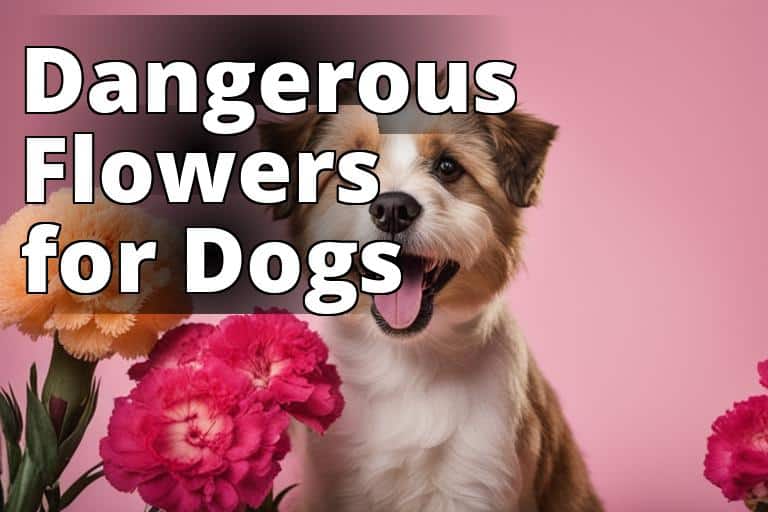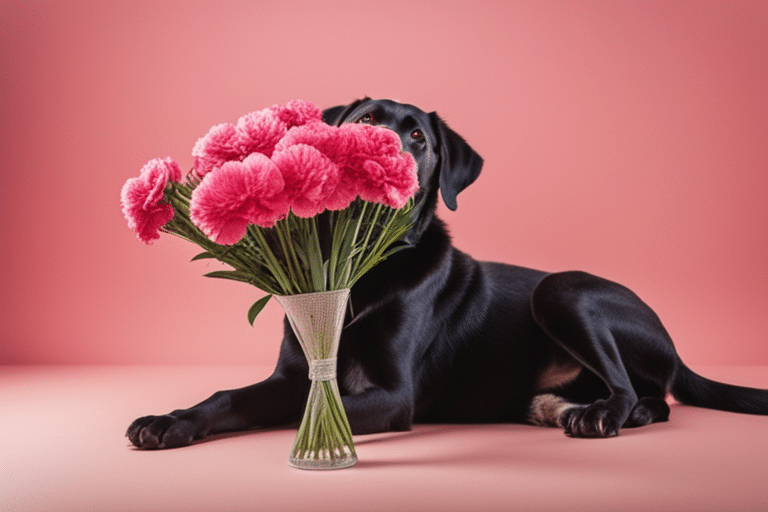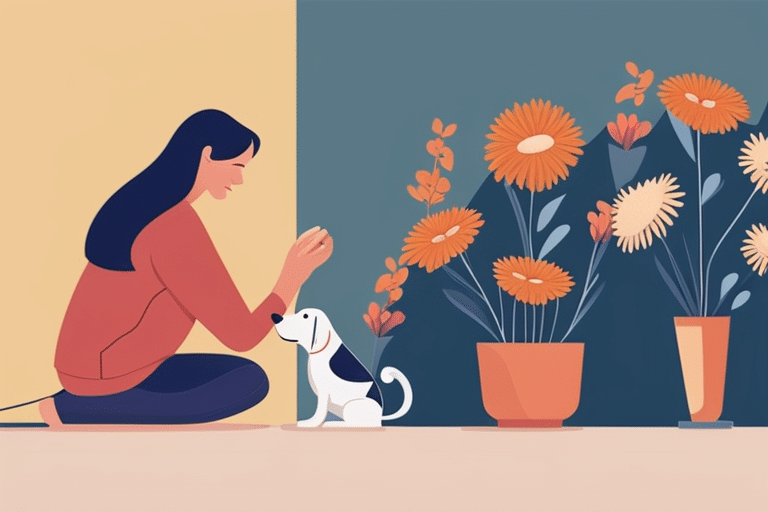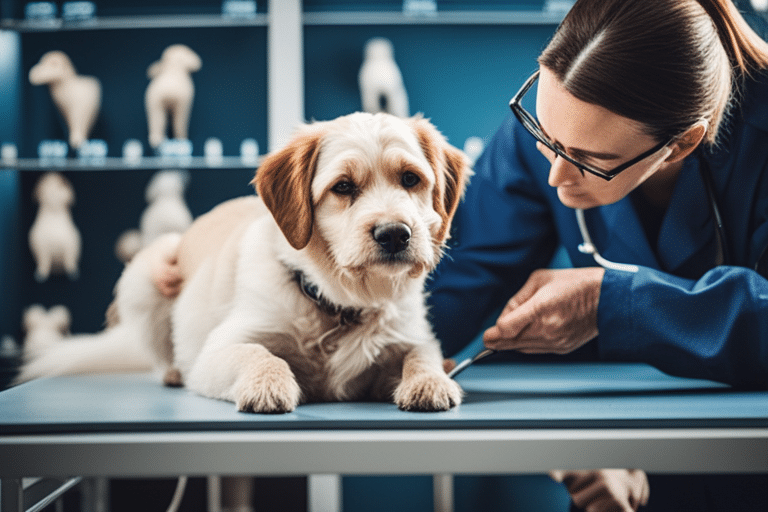

Carnations are a popular choice for floral arrangements and decorative displays due to their vibrant colors and delicate blooms. Their versatility and longevity make them a frequent choice for gifts, celebrations, and ornamental purposes. However, concerns have been raised about the potential toxicity of carnations to dogs, prompting the need to explore this issue thoroughly.

What You’ll Learn About Carnations and Dogs
By reading this article, you will learn:
– Carnations can be toxic to dogs if ingested.
– Symptoms of carnation poisoning in dogs include gastrointestinal distress, allergic reactions, and neurological effects.
– Precautionary measures, safe floral alternatives, and the importance of consulting a veterinarian for pet safety concerns.
Understanding Carnation Toxicity in Dogs
Chemical Compounds in Carnations
Carnations contain chemical compounds such as dianthramine, which can be toxic to dogs when ingested. These compounds are part of the plant’s natural defense system and can pose a risk to canine health if consumed.

Risks Associated with Ingestion by Dogs
When dogs ingest carnations, they are at risk of experiencing adverse health effects due to the toxic compounds present in the flowers. It’s essential for pet owners to be aware of these risks and take necessary precautions to prevent accidental ingestion.
Comparison of Toxicity Levels in Different Carnation Varieties
Different varieties of carnations may contain varying levels of toxic compounds, leading to differences in their potential impact on canine health. Understanding these differences can help pet owners make informed decisions about the safety of floral arrangements in their homes.
Symptoms of Carnation Poisoning in Dogs
Gastrointestinal Distress
Ingesting carnations can lead to gastrointestinal issues in dogs, including vomiting, diarrhea, and abdominal discomfort. These symptoms may indicate the presence of toxic compounds affecting the digestive system.
Allergic Reactions
Some dogs may exhibit allergic reactions to carnations, which can manifest as skin rashes, itching, and swelling. These allergic responses are indicative of the body’s adverse reaction to the plant’s compounds.
Neurological Effects
Toxic components in carnations can affect the nervous system of dogs, leading to symptoms such as disorientation, tremors, and seizures. These neurological effects signal a serious health concern requiring immediate attention.
Respiratory Issues
Inhalation of pollen or other airborne particles from carnations can result in respiratory distress in dogs, causing coughing, wheezing, or difficulty breathing.
Skin Irritation
Direct contact with carnations can cause skin irritation in dogs, leading to redness, itching, and inflammation. This can occur when dogs come into contact with the flowers or their sap.
| Symptoms of Carnation Poisoning | Effects of Carnation Ingestion on Dogs |
|---|---|
| Gastrointestinal Distress | Immediate Effects |
| Allergic Reactions | Potential Long-Term Health Impacts |
| Neurological Effects | |
| Respiratory Issues | |
| Skin Irritation |
The Effects of Carnation Ingestion on Dogs
Immediate Effects
Upon ingestion, toxic compounds in carnations can rapidly affect a dog’s health, leading to the onset of symptoms such as vomiting, diarrhea, and discomfort. Immediate veterinary attention is crucial to address these acute effects.
Potential Long-Term Health Impacts
Repeated exposure to carnations or ingestion of large quantities over time may result in long-term health impacts on dogs, including organ damage and chronic health issues. Understanding the potential long-term effects is essential for pet owners to prioritize their dog’s well-being.

Safe Floral Alternatives for Dog-Friendly Environments
List of Non-Toxic Flowers for Dogs
Exploring non-toxic floral options can help pet owners create safe and pet-friendly environments. Flowers such as roses, sunflowers, and orchids are non-toxic alternatives that can be incorporated into floral displays without posing a risk to dogs.
Tips for Creating Pet-Safe Floral Displays
Implementing strategies such as elevated floral arrangements, secure vases, and limited access to flowers can contribute to creating a pet-safe environment while enjoying the beauty of floral decorations. For comprehensive information about non-toxic floral alternatives, the “Toxic and Non-Toxic Plants” – American Society for the Prevention of Cruelty to Animals (ASPCA) can be referenced.

Precautionary Measures and Pet Safety
Strategies to Prevent Accidental Ingestion of Toxic Plants
Implementing measures such as plant placement, supervision, and training can help prevent dogs from accessing and ingesting toxic plants, including carnations.
Safe Storage and Display of Flowers in Homes with Pets
Storing flowers in secure locations and using pet-proof barriers can minimize the risk of accidental exposure to toxic plants, ensuring the safety of pets within the home environment.
Creating a Pet-Safe Environment
Removal of Potentially Harmful Plants
Identifying and removing potentially harmful plants, including toxic flowers like carnations, from indoor and outdoor spaces is essential for creating a pet-safe environment.
Creating a Pet-Friendly Indoor Garden
Establishing an indoor garden with pet-friendly plants and flowers can provide a safe and enriching environment for dogs, allowing them to enjoy the natural beauty without exposure to harmful flora.
Identifying Toxic Components in Carnations
Parts of the Plant That Pose Risks to Pets
Various parts of carnations, including the stems, leaves, and flowers, contain toxic compounds that can pose risks to pets. Understanding these components is crucial for preventing accidental ingestion.
Understanding Other Flowers Toxic to Dogs
List of Common Flowers Toxic to Dogs
In addition to carnations, several other common flowers pose toxicity risks to dogs. Examples include lilies, daffodils, and tulips, each with its own set of potential health impacts when ingested.
Specific Risks and Symptoms Associated with Different Flowers
Different toxic flowers exhibit varying levels of toxicity and can lead to a range of symptoms in dogs, highlighting the importance of awareness and precautionary measures.
Impact of Carnation Consumption on Other Animals
Natural Predators and Herbivores
In their natural habitat, certain animals may consume carnation flowers without experiencing adverse effects, showcasing the variable impact of these flowers on different species.
Potential Impact of Carnation Consumption on Different Animals
Understanding the potential impact of carnation consumption on various animals can provide insights into the diverse responses and tolerances to the plant’s compounds.

Importance of Veterinary Consultation
Seeking Professional Advice for Pet Safety Concerns
When in doubt about the safety of specific plants, including carnations, consulting a qualified veterinarian is essential for tailored guidance and recommendations.
Understanding Individual Pet Sensitivities and Risks
Each dog may have unique sensitivities and responses to certain plants, emphasizing the need for personalized veterinary consultation to address individual pet health concerns.
Conclusion
In conclusion, the potential toxicity of carnations to dogs warrants careful consideration by pet owners. Understanding the risks, symptoms, and precautionary measures is crucial for creating a safe and pet-friendly environment. By prioritizing pet safety and seeking professional guidance, pet owners can ensure responsible ownership and the well-being of their canine companions.
Bibliography
1. “Toxic and Non-Toxic Plants” – American Society for the Prevention of Cruelty to Animals (ASPCA)
2. “Poisonous Plants” – Pet Poison Helpline
3. “Carnation Poisoning in Dogs” – Veterinary and Animal Science Journal
Disclaimer: The information provided in this article is for educational and informational purposes only. It is not a substitute for professional veterinary advice. Pet owners should consult with a qualified veterinarian for specific concerns about pet safety and potential toxicity.
Answers To Common Questions
Who should I ask about the toxicity of carnations to dogs?
You should consult your veterinarian about the toxicity of carnations to dogs.
What makes carnations potentially toxic to dogs?
Carnations contain substances that may cause mild gastrointestinal upset in dogs.
How can I keep my dog safe from carnation toxicity?
Keep carnations out of reach and consider pet-safe alternatives for floral arrangements.
Aren’t carnations only toxic to dogs in large quantities?
Even small ingestions of carnations can cause discomfort in dogs, so caution is advised.
Can I take immediate action if my dog ingests carnations?
If your dog consumes carnations, contact your vet for guidance on next steps.





